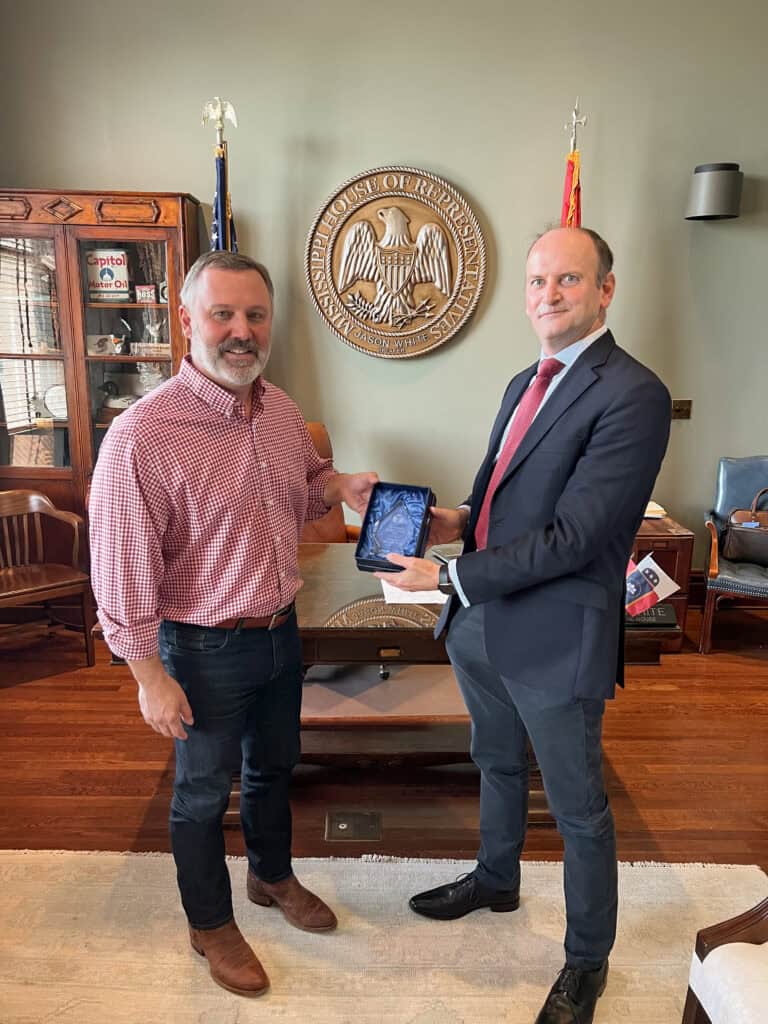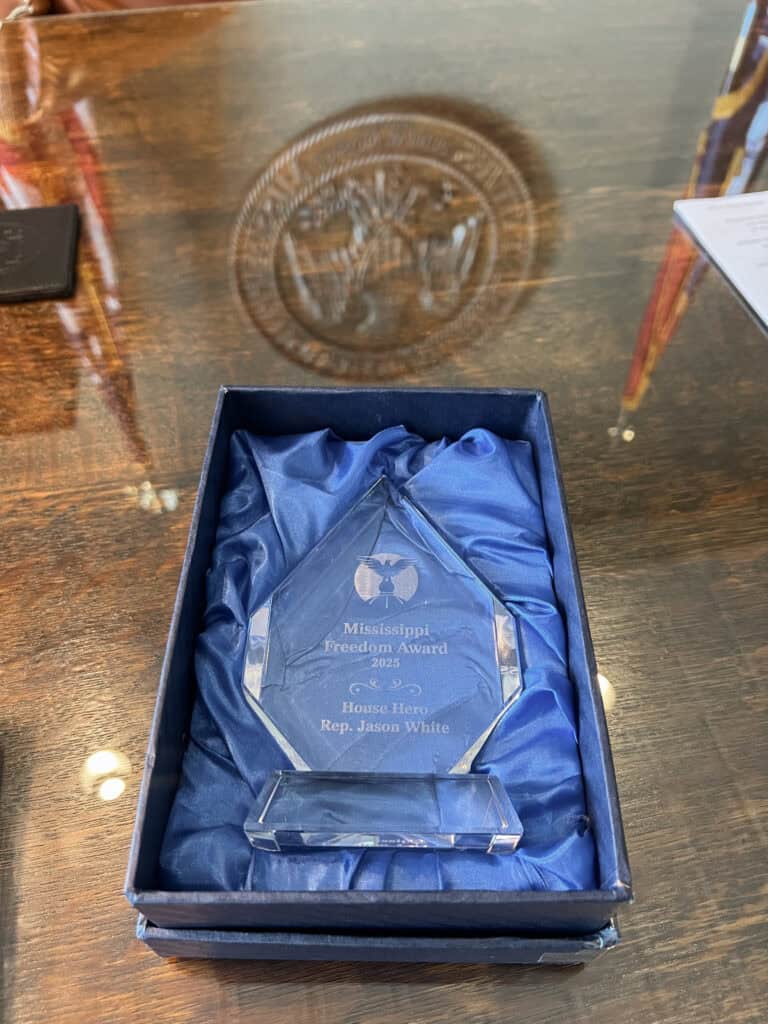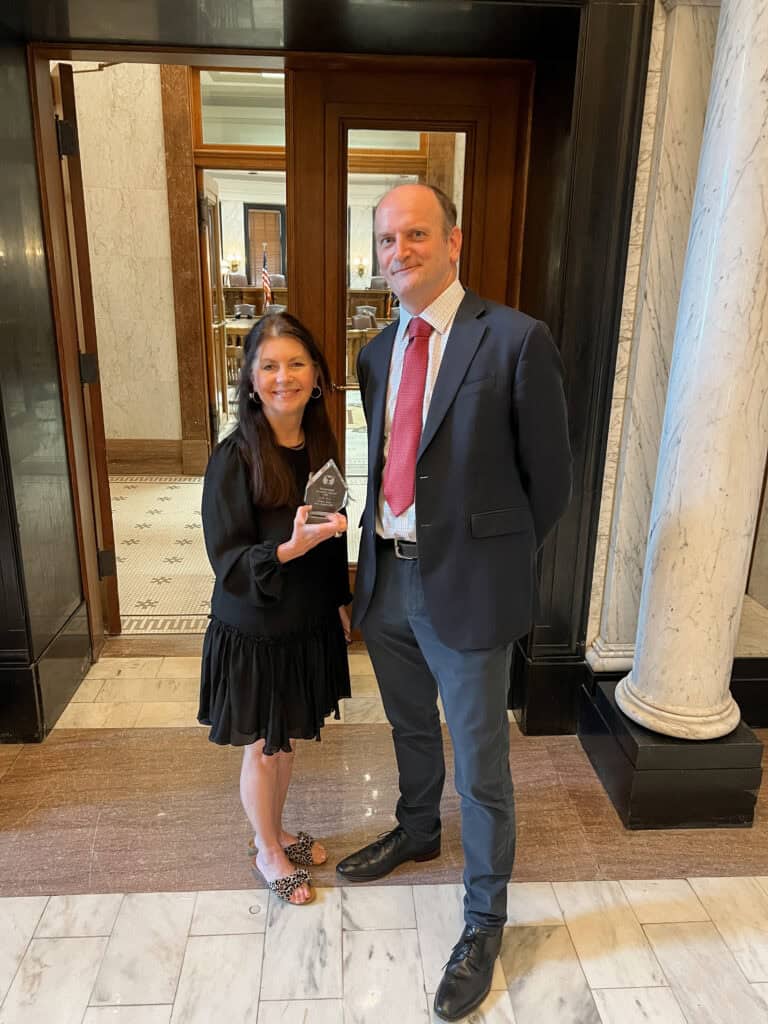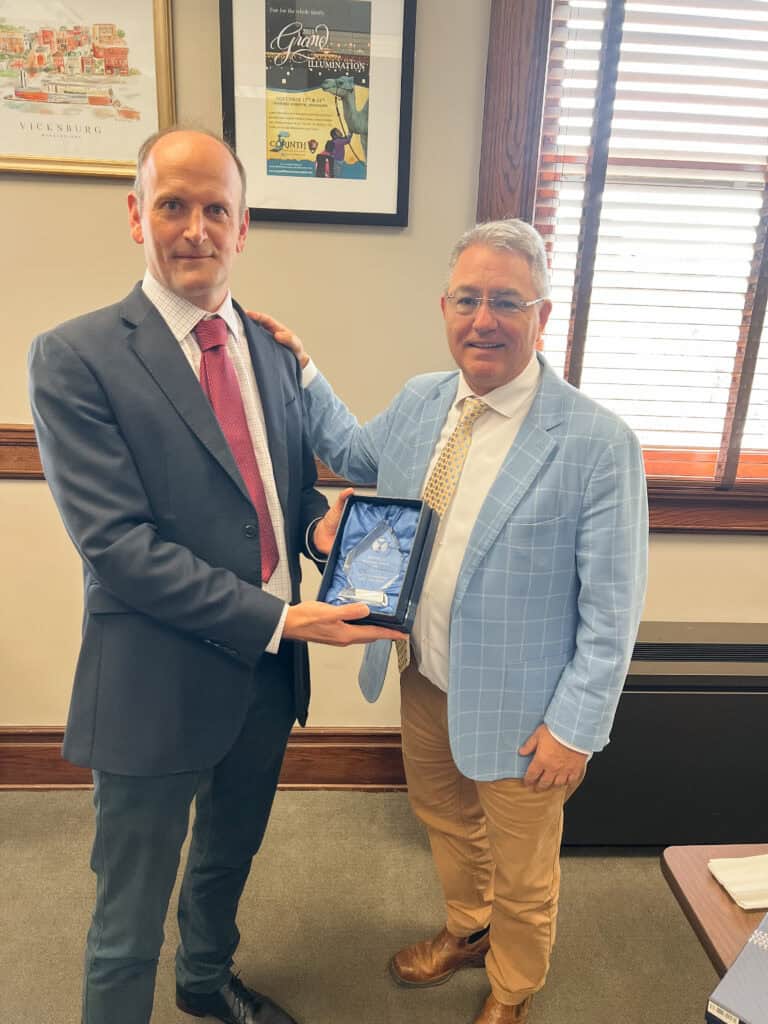What is the secret of America’s success? Federalism. Thanks to the genius of the Founders, each state is allowed to do things differently, which enables innovation.
It is so exciting to see Mississippi now leading the way with bold, free-market reforms that have begun to unleash growth, providing a model for other states to follow.
After decades being last, Mississippi is has started to see some remarkable results:
- Explosive Economic Growth: In 2024, Mississippi’s real GDP grew by 4.2%, ranking 2nd nationally, outpacing California (2.1%), New York (1.8%), and Texas (3.9%), per the BEA’s Q4 2024 data. Nominal GDP jumped 6.7% ($2.58 billion), also 2nd in the nation.
- Surging Incomes: Personal income growth ranked 4th nationally in Q3 2024. From 2000 to 2022, per capita income soared 140% (3.6% annually), from $21,500 to $46,200. With our low cost of living, Mississippians are enjoying one of the most rapid increases in living standards in America.
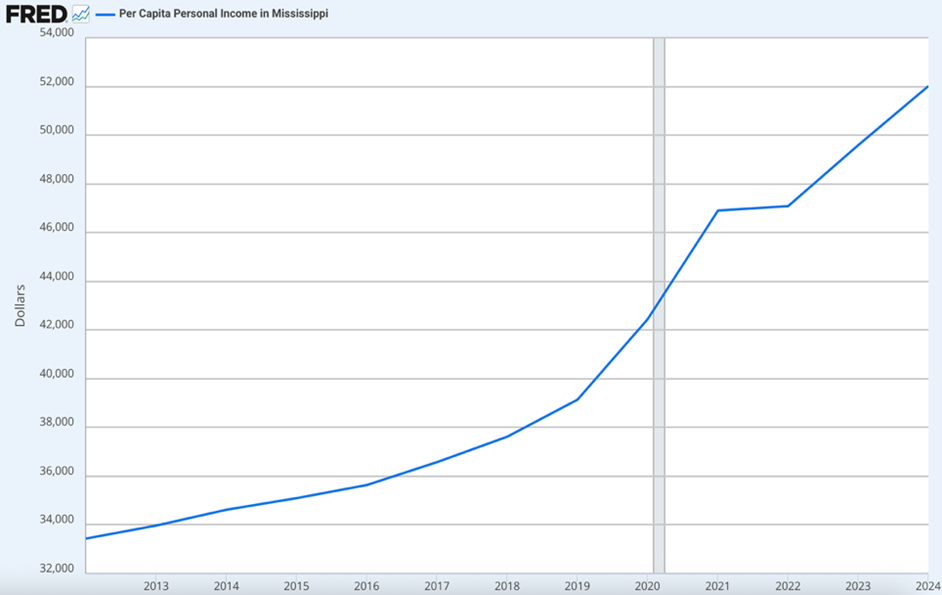
Mississippi personal income has increased rapidly
- Global Competitiveness: Being a British immigrant, I was fascinated to see that in 2023, Mississippi’s per capita output surpassed the UK’s. Even better, this year, we’re projected to overtake Germany’s per capita output.
- Investment Boom: Over $20 billion in new investment projects have been announced in the past couple of years. That means private dollars are investing in the future of our state because they think we have a great future.
This economic renaissance didn’t happen by accident. Growth is a direct consequence of the kind of free market reform MCPP has been advocating for:
- Historic Tax Cuts: In 2022, Mississippi passed the largest tax cut in state history, phasing in a 4% flat income tax by 2026.
- Labor Market Deregulation: By reducing red tape, we’ve empowered businesses to hire and innovate, boosting job creation (some estimates suggest 56,000 export-related jobs in 2022 alone).
- Conservative Budget Responsibility: A steady budget surplus has been important.
- Low cost energy: Mississippi managed to avoid a lot of the renewable energy policies that have pushed up costs in places like California.
We need to maintain this new momentum – and to do that there are plenty more policy changes we must make. Education standards are not as good as some would like to suggest. It is vital that we allow school choice. There are far too many red tape restrictions holding back the local economy, especially the protectionist rules in the healthcare sector.
Most important of all, perhaps, our state leaders need to restrain public spending, which has increased rapidly. We need to ensure that we continue to control spending so that we maintain modest budget surpluses.
But let’s take a moment to recognize that Mississippi is actually doing rather well. So much so, in fact, that other states might have something to learn from what our state leaders have got right.
President Trump has established a baseline 10 percent tariff on nearly all imports. Additionally, the White House announced plans for reciprocal tariffs on 57 countries. A week later, on April 9, the administration then paused these reciprocal tariffs for 90 days.
We don’t know if the reciprocal tariffs will take effect after July 9. What is certain is that in addition to the 10% baseline tariff, there is a 25% tariff targets car imports and most goods from Canada and Mexico, and a staggering 125% tariff is in place on most Chinese imports.
Some of my conservative friends like to imply that tariffs are part of a cunning plan to eliminate the federal income tax. They point out that until 1913 America did not have a federal income tax, and the federal government was largely funded by tariffs.
Now I’m all in favor of eliminating income taxes, and I spent much of the last legislative session in Mississippi advocating for the repeal of our state income tax. But the numbers don’t add up for replacing the federal income tax with tariffs. To generate the $2.6 trillion annually that the income tax provides, tariffs would need to average 127% on all imports (even accounting for an estimated 20% drop in import volume). Do that and only rich folk will be able to shop at Walmart.
Others have told me that we need these tariffs to protect American industry against offshoring and the loss of American jobs overseas. Really?
US output today is close to three times higher than it was when LBJ was President. US factories make almost twice as much stuff as they did when Ronald Reagan left the White House. The growth in US industrial output happened while tariffs declined from 6-8 percent in 1969 to about 2 percent by 2010 (with a slight increase by 2020 due to higher tariffs on China).
It is true that the number of manufacturing jobs in America has fallen, as manufacturing output has risen. But that is because fewer workers in industry are able to make more. The same thing happened in farming a century before. The loss of farming or manufacturing jobs has not made Americans poorer. It means Americans went and found work in better paying jobs.
That’s why the total number of jobs in America has risen despite the fact that the proportion of Americans working in manufacturing has fallen. There were 70 million jobs in 1969 and there are 160 million jobs today. So much for free trade taking away our jobs.
“But what about China?” some say
America should be worried about China. It’s alarming that China’s Jiangnan Shipyard builds more ships in a single year than all U.S. shipyards combined. It’s concerning that China produces more drones in a day than the U.S. does in a year.
But if China is our primary concern, why hit countries like Vietnam, South Korea, and India—potential competitors to China—with crippling tariffs?
Tariffs won’t eliminate the federal income tax, reverse a supposed industrial decline, or solve the question of how to deal with an aggressive China. What they will do is make you poorer and America less competitive.
Consider your cell phone. Apple has already stated that tariffs will increase its costs by nearly $1 billion this quarter alone. That extra cost? It’s coming out of your pocket when you buy your next iPhone. To dodge new tariffs on Chinese goods, Apple is shifting much of its manufacturing from China to India. Don’t expect new iPhone factories in Mississippi or Michigan—think Madras instead.
Ironically, the high-value work on smart phone production—the design, software, and chips—is already done in the U.S. Tariffs will simply move low-value assembly from one Asian nation to another, leaving you to foot the bill.
My big fear this that tariffs won’t just be seen as having triggered an economic downturn. By doing so they will overshadow all those other conservative wins.
During my recent trip to Washington, several administration insiders suggested that the current tariff strategy is part of a broader plan. They claim tariffs are being used as leverage to dismantle restrictions on U.S. exports to other countries.
Whether or not this was the original intent, I hope it becomes the retrospective rationale. For instance, if a close ally like the UK, which runs a trade deficit with the U.S., agreed to eliminate all its tariffs and allow any product sold in America to be sold in the UK, the U.S. could respond in kind. Such a trade agreement with the UK could set a precedent, encouraging other allies—Japan, India, Australia—to follow suit. The result might be the complete removal of trade barriers between the U.S. and its allies. That’s the optimistic scenario. The alternative is higher costs for everyone, leaving us all poorer.
Mississippi is on the move. Over the past five years, economic output rose more than it did over the previous fifteen.
According to data from the Federal Reserve Bank of St. Louis, Mississippi’s economic output has soared by $41.4 billion, climbing from $116.1 billion in 2019 to $157.5 billion in 2024. That’s more growth in half a decade than we saw in the previous fifteen years combined.
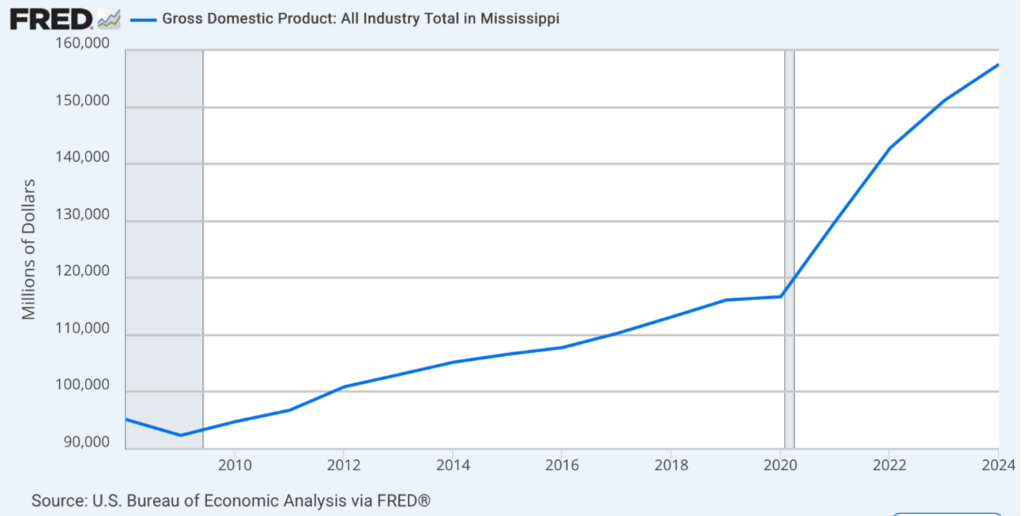
This growth did not happen by chance. It came about thanks to deliberate, pro-growth policies that are transforming our state.
In 2021, we saw labor market deregulation with a bill to reform occupational licensing. Then in 2022 came a substantive tax reform bill, which paved the way toward the income tax elimination bill passing in 2025. At the same time, Mississippi has kept energy costs low and rolled out the red carpet for inward investors.
Every one of these victories came about thanks to principled conservative leaders who fought for change against fierce opposition from leftist lawmakers wedded to the status quo. At the time that these reforms were proposed, there was no kumbaya consensus in favor of any of it. Change only happened because a handful of conservative leaders – and dare I say it conservative organizations - were willing to go out on a limb for it.
The Mississippi Center for Public Policy (MCPP) recently honored some of those in our legislature that truly are committed to this pro-growth agenda, and we should all celebrate their determination.
But the question remains: Is your local lawmaker part of Mississippi’s new pro-growth agenda, or are they standing in the way?
Did your own Representative and Senator help lead Mississippi’s growth, or are they one of the one’s that opposed everything but showed up for the cameras?
Despite Mississippi’s strong conservative majority, we often fall short on basic conservative priorities like school choice. Too many solid bills mysteriously “die in committee” with no explanation, no recorded votes, and no accountability. Lawmakers who oppose pro-growth policies have gotten away with vague soundbites on Supertalk, dodging any real consequences. That ends now.
The new Mississippi Freedom Index, which you can access by logging on to our website at mspolicy.org, empowers everyday Mississippians to hold their representatives accountable. This tool shows how your lawmaker voted on key pro-growth policies, details their campaign finance contributions, and even lets you message them directly.
We’ve identified four flagship growth policies that define Mississippi’s economic surge—any lawmaker who opposed them doesn’t meet our definition of a conservative, plain and simple.
So, where does your representative stand? Log on to mspolicy.org and click on the Freedom Index to find out. If any lawmaker disagrees with their rating, they’re welcome to reach out. They can post their remarks, or if they’re willing to publicly commit to supporting the policies they didn’t vote for, we’ll reconsider their score.
Mississippi is on the rise. Check the Freedom Index today—because our state’s future depends on leaders who deliver, not ones who hide.
Jackson, Miss. — The Mississippi Center for Public Policy (MCPP) proudly announces the recipients of the 2025 Mississippi Freedom Awards—an annual tradition that honors the lawmakers who boldly champion liberty, economic growth, and individual rights during the legislative session.
“This year, we set an ambitious agenda: eliminate the income tax, expand school choice, push back against divisive DEI initiatives, and reduce the red tape stifling healthcare,” said MCPP President Douglas Carswell. “Thanks to courageous leadership in the Legislature, we’ve secured historic victories for Mississippi families.”
Among the honorees are several standout lawmakers:
- Representative Trey Lamar led the successful charge to eliminate the state income tax. Working closely with Speaker Jason White, Lamar’s transparent and thoughtful approach exemplified what pro-growth policymaking should look like.
- Representative Jason White, Speaker of the House, is recognized as the 2025 House Hero for uniting and leading on key reforms, most notably the income tax overhaul. His steady leadership continues to chart a path for prosperity.
- Senator Angela Hill, named the 2025 Senate Hero, took bold action to fight harmful DEI mandates and stood firm for educational and individual liberty.
- Representative Jansen Owen was honored for his tireless efforts to expand school choice in Mississippi through HB 1435, pushing a policy that would bring Mississippi in line with neighboring states.
- Representative Hank Zuber III was recognized for his long-standing work to reform healthcare regulations and push back on outdated Certificate of Need laws, aiming to improve access and competition in the state’s healthcare system.
- Representative Sam Creekmore earned recognition for his focused efforts to cut red tape and streamline processes that hinder economic development. With a pragmatic and solutions-oriented mindset, Creekmore worked to identify and remove bureaucratic barriers that stall progress across sectors—particularly in healthcare and infrastructure. His commitment to smart, conservative reform has made him a valuable force in the push for a more efficient and responsive government.
“These lawmakers didn’t just vote the right way—they led the fight,” MCPP noted in a statement. “When others hesitated, they stood firm for freedom.” While not every legislative priority crossed the finish line this year, the victories achieved mark serious momentum for pro-growth reform. With income tax elimination and anti-DEI legislation now enshrined into law, Mississippi continues to position itself as a beacon of freedom and innovation in the South.
Last week I went to Washington, and had meetings at the White House, Congress (Senate & the House), as well as with various think tanks.
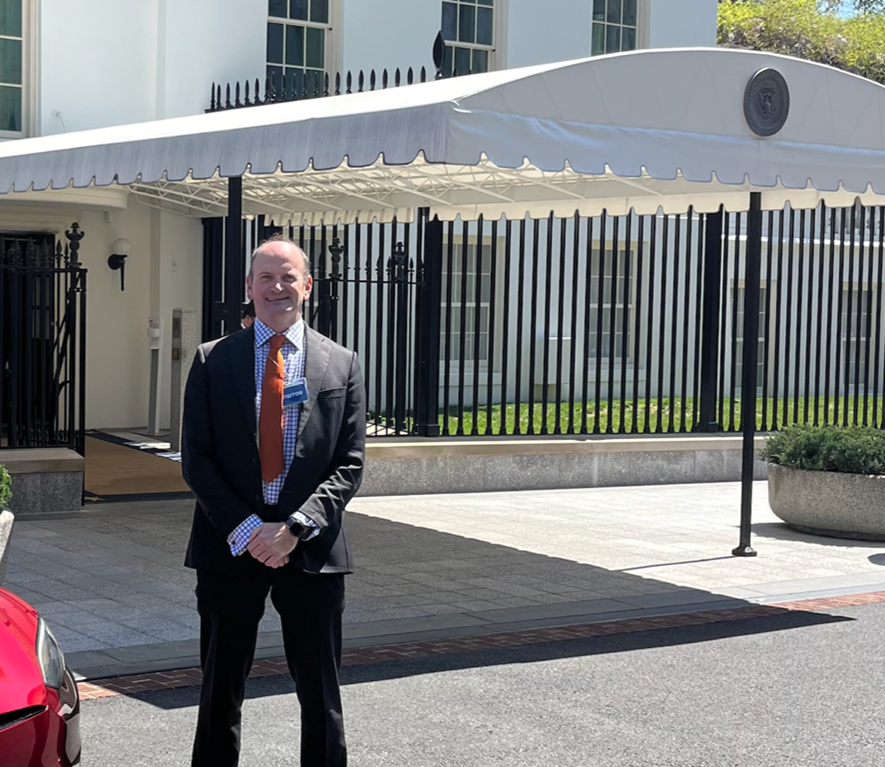
I gave a presentation about Mississippi income tax elimination to Americans for Tax Reform, too.
Mississippi is the 2nd fastest growing state in America, with the 5th fastest increase in personal income. We have just passed legislation to abolish the income tax, and have received record levels of inward investment.
That means there is tremendous interest in our state, and what our pro-growth policies have started to achieve.
It was an honor to talk about the Mississippi success story, with so many positive policy wins. I was really struck by the strong support for the Magnolia state and pro-growth policies.
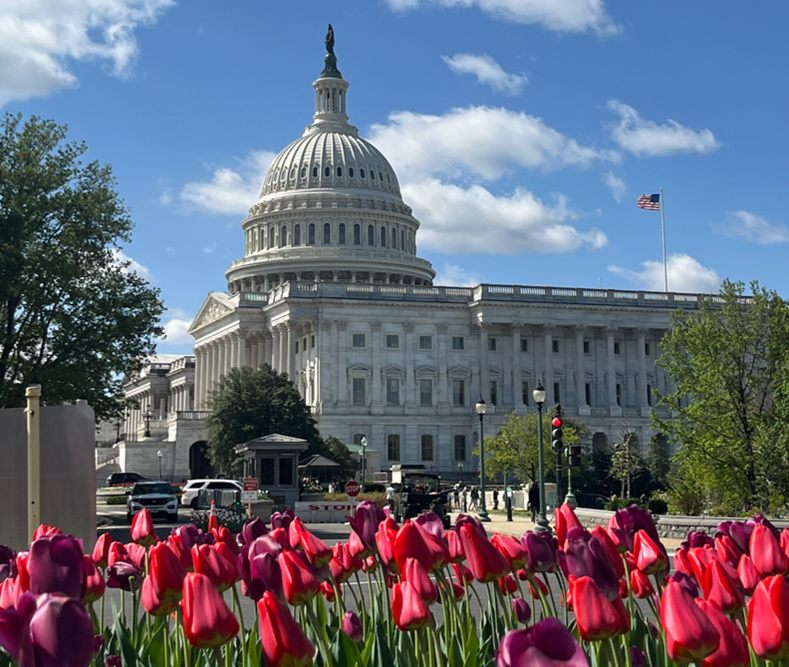
Those I talked to in Washington are very aware of Mississippi’s successes. (Even more so now). I suspect this interest will only increase.
When I flew home from Washington, I felt so proud of our state.
Imagine what Mississippi could achieve if we used our conservative super majority to go even further with pro-growth policies?
Mississippi was the second fastest growing state in the last quarter of 2024, according to new data from the US Bureau of Economic Analysis. Output per person in the Magnolia state increased faster than any state besides Arkansas.
One set of data might be a fluke, but then the previous quarterly data told a similar growth story. We are starting to see a trend as Mississippi takes off economically.
Mississippi’s been stuck at 50th out of 50 for so long, some struggle to believe we could be anywhere else. But here’s the kicker: our per capita GDP zipped past Britain’s in 2023 and is set to overtake Germany’s this year. If the explosive growth from late 2024 keeps up, we’ll leapfrog several U.S. states in the next decade. That “last place” label? It’s starting to peel off.
What’s behind this turnaround? Free market reforms—plain and simple. Mississippi was held back by high taxes, stifling regulations, and cartels—especially the one under the Capitol dome in Jackson—calling the shots.
A generation ago, Mississippi’s economic development strategy was to send long serving politicians to Washington DC to hustle for handouts. If federal subsidies made a state rich, ours would have been the wealthiest state in the Union.
But today, we’re growing because bold leaders—backed by your support—are pushing pro-growth policies:
- Tax Cuts: Since we started trimming the income tax to a flat 4% in 2022, the Mississippi Development Agency estimates there’s been a whopping $19 billion inward investment. Businesses are flocking here, confident that their payroll taxes will tumble.
- Flexible Labor Market: Already an “at-will” employment state, Mississippi passed a little noticed law in 2021 to ease occupational licensing. Local boards are increasingly under pressure to reduce onerous red tape.
- Business-Friendly Planning: While other states drown companies in approval processes, Mississippi rolls out the welcome mat.
- Cheap Energy: Two new data centers are coming, and they’ll need oodles of electricity. Good thing Mississippi’s natural gas and nuclear keep our electricity cheap—around 13.43 cents per kWh versus California’s wallet-busting 34.26 cents. Affordable energy is turbocharging our growth.
Mississippi has only adopted pro-growth policies because a handful of bold conservative leaders have been prepared to fight for them. Just three weeks ago, our Senate’s current leadership was maneuvering against income tax elimination.
Imagine what we could achieve if the Senate was on board with free market reform? We’re surrounded by states with school choice, but our Senate blocked even a modest public-to-public option. Healthcare’s tangled in “certificate of need” nonsense, and Senate leaders killed that fix too.
Mississippi is on the rise, but we need to double down on pro-growth reforms, especially school choice. Thank you for standing with us—together, we’re making Mississippi boom!
%Position% %FullName%
Party: %Party% | District: %District%
2025 Legislative Votes
School Choice: %SchoolChoice%
Income Tax: %IncomeTax%
DEI: %DEI%
Healthcare: %HealthcareRedTape%





